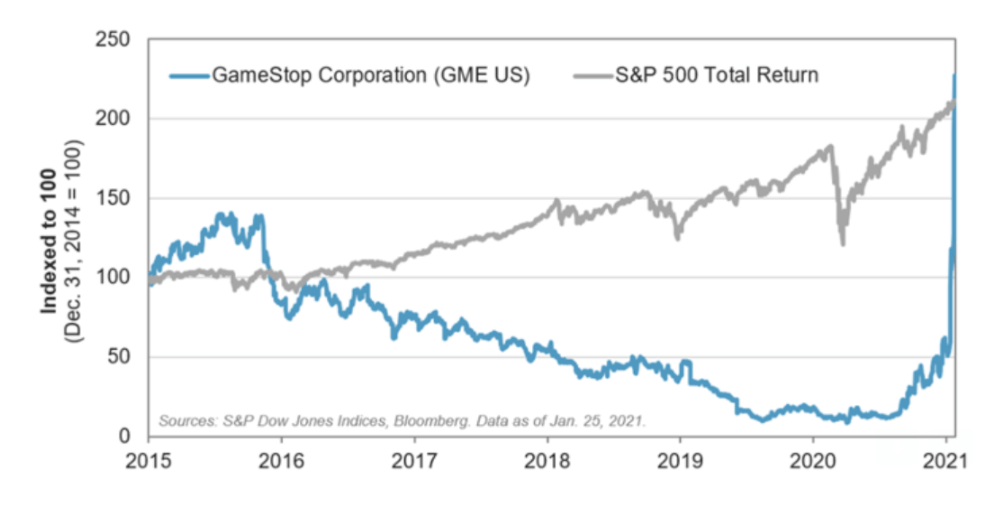
Photo by Brett Jordan from Pexels
Each week, Cut the Crap Investing founder Dale Roberts shares financial headlines and offers context for Canadian investors.
Redditors took on hedge funds—and won!
Not to be outdone, the year 2021 turns to 2020 and says “hold my beer.”
Just when you thought that things couldn’t get any loopier, along comes the story of the week: An army of retail investors organized on Reddit to force hedge funds out of their market positions using trades on GameStop stock (GME).
Here’s the backstory. As you may know, Reddit is an online chat platform with a strong bent to personal finance and investing topics. The topics are organized in forums. One such forum is WallStreetBets, now known as WSB for short. Many members of WSB decided to take on hedge funds that will bet against stocks—it’s calling shorting. When you short a stock you profit when the stock price goes down.
Here’s the shorting process simplified (there’s also a good explanation and graphic in this post):
- Borrow stock shares from a broker/dealer.
- Sell that stock to another investor.
- Wait for the price to fall.
- Buy the same amount of shares borrowed at the lower price.
- Return the shares to the broker.
- Pocket the difference, subtracting commissions.
Some hedge funds specialize in organizing very active campaigns designed to drive down share prices of the companies that they short. How? By releasing mountains of research and producing elaborate presentations in an attempt to convince the market that a stock might be mispriced, or that the company is in serious trouble. If they can drive down the stock price, the hedge funds making those short bets will prosper.
Here’s a link to The Motley Fool’s Mat Litalien reporting on the hedge fund Citron Capital, which organized an aggressive short campaign against Canada’s market darling Shopify. Citron is one of the hedge funds that had a significant short position in GameStop, the company at the centre of a dangerous stock market game that’s taken over headlines this past week.
A few other hedge funds, including Melvin Capital, have been aggressively shorting GameStop. Things got, shall we say, interesting, when Redditors rallied around the GameStop stock, driving up the price. As a result, GameStop, which entered 2021 trading in the $17 range, closed above $325 on Wed., Jan, 27. On Thursday the stock fell to $236 as the Robinhood trading app restricted the selling of GameStop stock. TD Ameritrade, followed suit limiting trading on the stock.
On Friday, the Redditors were allowed to buy again, sending the stock to over $390 by the morning of Jan. 29.
This story gets more interesting by the minute.
 This action is called a short squeeze. Now, with the stock price soaring instead of falling, as the shorters expected, those who are shorting the stock are facing incredible losses. And there is no limit to their potential losses as the stock can always keep going higher.
In this round of battle, it appears the Redditors won; Melvin Capital closed out its short position after suffering significant losses. From that post, you’ll read that two other hedge funds came to their rescue and offered a cash infusion:
This action is called a short squeeze. Now, with the stock price soaring instead of falling, as the shorters expected, those who are shorting the stock are facing incredible losses. And there is no limit to their potential losses as the stock can always keep going higher.
In this round of battle, it appears the Redditors won; Melvin Capital closed out its short position after suffering significant losses. From that post, you’ll read that two other hedge funds came to their rescue and offered a cash infusion:
“Earlier this week prominent hedge funds Citadel and Point72 Asset Management extended a $2.75 billion financial lifeline to the fund. People familiar with the fund said it lost almost 30% in the first three weeks of January.”
Redditors claim the big-money and hedge funds have had their way for decades, manipulating the markets for their own profit. Recent events are perhaps a taste of their own medicine; the the Redditors’ march is also market manipulation, plain and simple. Two wrongs might not make a right, but this is where we are.
And this is not an event to be quickly dismissed—many have called the Redditors’ market manipulation a display of continued civil unrest in the U.S. This is “Occupy Wall Street”—and that’s the hashtag on Twitter, #occupywallstreet2021.
This is a protest, and the protesters don’t need to march down Wall Street for this fight; they just log on to Reddit and then to their brokerage accounts to let the fingers do the walking. They buy stock and squeeze the shorts.
Whether you agree with the Redditors or simply think you spot an easy trading opportunity, keep in mind that this is very dangerous territory. Anyone who gets involved should be prepared to lose it all, or lose a lot: Buyers and shorters beware.
Likely, you’ve noticed that the markets are down this week. The markets don’t like the type of disruption and uncertainty the GameStop saga has created. This stock war creates selling pressure: Distressed short sellers have to sell shares from the broader market to raise funds to pay for losses on their shorts. That can drive down the broader markets.
U.S. stocks were down about 2.5% from Monday to Wednesday.
But this is not over. The Redditors won the first battle. Will they win the war? Perhaps hedge funds will be “better behaved,” or more cautious moving forward. The Redditors are watching.
Massive earnings week
If stock wars were not enough excitement for one week, we are also into peak earnings season, with many of the major companies reporting in the U.S. and Canada.
Just as 2020 offered, many of the monster tech companies continue to have their way. Current earnings releases will report the performance for the period from October through end of December 2020.
I own many of the big names reporting this week, including Apple (APPL). For the quarter, Apple revenues hit all-time highs. Apple reported all-time high revenue of $111.4B (+21%) and EPS of $1.68, up 35%. iPhones, services and wearables all hit new revenue records. The company and stock is firing on all cylinders.
Electric-vehicle maker Tesla missed earnings estimates, but continues to deliver strong profits. Revenue of $10.74B was up 45.5% year over year. And CEO Elon Musk suggests the company can continue to grow revenues near that 50% clip. (You might remember from last week’s post—and speaking of shorts—that Michael Burry is contemplating Tesla as the next Big Short).
Starbucks continues to see soft numbers, as dining-out behaviours are still changed due to the pandemic. And with lockdowns in place in many regions in North America, we are still largely in a stay at home and work from home economy. Revenues were down almost 5% year over year, but they were able to beat earnings estimates.
I own Microsoft, and was happy to see them beat on revenue and beat on earnings. Revenue was up almost 17% year over year. As reported on Seeking Alpha…
“Accelerating demand for our differentiated offerings drove commercial cloud revenue to $16.7 billion, up 34% year over year,” said Amy Hood, executive vice president and chief financial officer of Microsoft. “We continue to benefit from our investments in strategic, high-growth areas.”
My U.S. tech basket of Apple, Microsoft, Qualcomm (QCOM) and Texas Instruments (TXN) continues to provide a very strong total return growth kicker.
Earnings north of the border
In Canada, grocer Metro reported. Of course, they are more than well-situated in the cook-from-home economy. They had a very strong 2020 and in the final quarter of the year revenues were up 11.7% year-over-year. Earnings also beat estimates.
We’ve covered the challenges of Canadian telcos in this space before. This quarter, Rogers Communications was first to report. Revenues were down 6.8% year over year, though they were able to beat earnings estimates. Telcos continue to face challenges with no roaming fees to charge as folks stay close to home, and their retail sales outlets closed in many regions. Bell and Rogers both have media arms that face pressure with professional sports on modified schedules and advertising dollars taking a slight hit.
CN Rail (CNI) and CP Rail (CP) also reported this week. Railways can be a bellwether for economic health: they will send a signal on the demand for goods that are being moved across the country.
CP Rail had a very strong quarter with beats on revenue and earnings. That said, revenues were down 2.9% year-over-year, reflecting general economic weakness. CN Rail also beat expectations for earnings and revenue, with revenue up 2.2%.
CN announced a 7% increase to their dividend. This is a fantastic dividend growth stock, the yield is a modest 1.7%. One of the wide moat stocks in Canada, it has delivered very generous total returns.
Walgreens’ new CEO breaks a glass ceiling or two
And this story of diversity deserves a mention. Walgreens has announced Roz Brewer as their new CEO. From that Yahoo Finance post …
“Starbucks (SBUX) chief operating officer and group president Roz Brewer is leaving the coffee giant to join Walgreens Boots Alliance (WBA) as its CEO, making her the only Black female CEO of a Fortune 500 company.”
This is wonderful news on more than one front, first for the breaking of barriers. And Walgreens shareholders (like me) are rejoicing. Brewer is an accomplished executive with a more than impressive resume. Prior to her time at Starbucks, Brewer was the CEO of Walmart’s (WMT) Sam’s Club. She also currently serves as a director at Amazon (AMZN). This combination of retail, logistics and technology background for strong companies with strong brands appears to be an optimal skill set for the Walgreens challenge.
After the announcement, Walgreens stock shot up almost 10% on Wed., Jan. 27.
This CNN Business post offered that only one other Black woman, Xerox’s former CEO Ursula Burns, has ever held the chief executive role at a Fortune 500 company.
Brewer will join this list of the 30 current women CEOs of S&P 500 companies. She takes the helm on March 15.
The triumph of “dumb money” in 2020
We’ll give the last word to hedge funds. The year 2020 saw the rise of Robinhooders and retail investors. If you’ve even had any doubts that they have the ability to move the markets, the recent GameStop story we discussed at the top of this post will lay that to rest. Perhaps it is a new reality for stock markets.
The Institutional Investor blog has called it the “Triumph of Dumb Money.” This article points out that when the markets crumbled in March of 2020, it was dumb money that provided much of the liqudity needed to bring the markets back to life.
The phenomenon was tracked by researchers Simon Glossner and Pedro Matos at the University of Virginia, and Stefano Ramelli and Alexander Wagner at the University of Zurich. They looked at how institutions managed their investments during the first wave of the pandemic. By and large, allocators were “rushing to exit” the markets, Matos says. So, who was buying those assets? “That led us to Robinhood,” according to Matos.
But there is concern that popular influencers on social media sites can push their favourite stocks, and to their own advantage. Godefroy Schrago, a partner at hedge fund research firm Sanostro offered…
“They manage to really move the markets with the tweets…the problem is the relevant information becomes not what the company says, but what one specific influencer says about an announcement.”
The rise of the retail investor is an incredible story and trend. They are making a lot of noise early in 2021, and they are attracting a lot of attention from regulators and the establishment. It will be interesting to watch and report on what happens now that they have a flashing target on their back.
On social media, those Redditors tell me it’s game on.
Dale Roberts is a proponent of low-fee investing who blogs at cutthecrapinvesting.com. Find him on Twitter @67Dodge.
MORE ON INVESTING:
Dale Roberts is a former investment advisor and proponent of low-fee investing. He created the Cut The Crap Investing blog in 2018. Find him on Twitter for market updates and commentary, every day.











